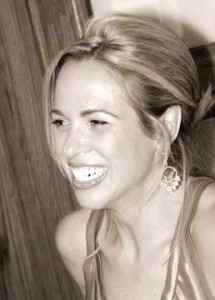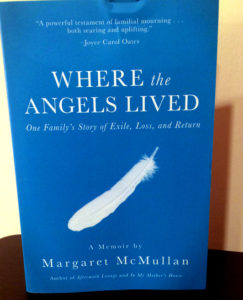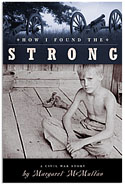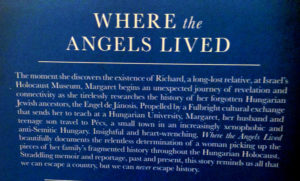Major Works
- Where the Angels Lived: One Family’s Story of Exile, Loss, and Return, memoir (2019)
- Every Father’s Daughter: Twenty-four Women Writers Remember Their Fathers, editor (2015)
- Aftermath Lounge: A Novel in Stories (2015)
- Sources of Light (2010)
- Cashay (2009)
- When I Crossed No-Bob (2007)
- How I Found the Strong: A Civil War Story (2004)
- In My Mother’s House (2003)
- When Warhol Was Still Alive (1994)
Margaret McMullan: A Biography
Margaret McMullan was born in 1960 in Newton County, Mississippi. Her father, James McMullan, was born in Lake, Mississippi. Her mother, Madeline Engel De Janosi, was born in Vienna, Austria, in 1929. They met at a dinner party in Washington, D. C. She has one sister Carlette. At the age of ten, her family left Mississippi and moved to Chicago, Illinois.
McMullan earned a Bachelor’s degree in Religious Studies from Grinnell College and an M.F.A. in Fiction from the University of Arkansas, Fayetteville.
For twenty-five years, she lived in Evansville, Indiana, where she taught and served as the Chair of the English Department at the University of Evansville. She was also the Melvin Peterson Endowed Chair in Literature and Creative Writing at the University of Evansville.
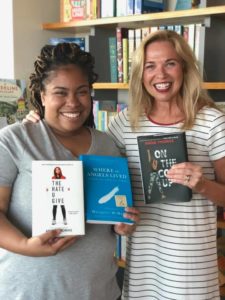
Mississippi writers Angie Thomas and Margaret McMullan hold their novels at Pass Christian Book. Photo courtesy of Scott Naugle and Pass Christian Books.
She is married to Patrick O’Connor, who is a screenwriter, director, and fiction writer. They have one son named James.
Her Work
McMullan has written many essays and short stories. These works have appeared in Glamour (where she was an associate entertainment editor), the Chicago Tribune, Southern Accents, the Indianapolis Star, TriQuarterly, Michigan Quarterly Review, The Greensboro Review, The Southern California Anthology, Other Voices, Boulevard, Ploughshares. and in A Very Southern Christmas: Holiday Stories from the South’s Best Writers.
When Warhol Was Still Alive, McMullan’s first novel, is set in the mid-80’s in Manhattan. The main character is a poorly paid, single woman named Catherine, whose job it is to compile and edit the entertainment page for a women’s magazine. It was published by Crossing Press in 1994, and her second novel, In My Mother’s House, was published by Picador (September 9, 2004).
She also co-wrote (with her husband Pat) the film Sacred Hearts. In addition, she has written three young adult novels: How I Found the Strong (2004), When I Crossed No-Bob (2007), and Cashay, which was published in April 6, 2009.
Her second novel, In My Mother’s House, published in 2003, is a fictional story, inspired by her maternal great-grandmother and the story moves from pre-World War II Austria to the United States a generation later. The novel is the story of a daughter’s desire to understand her mother’s silence about their family’s experiences in Vienna during World War II.
How I Found the Strong: A Story of the Civil War is McMullan’s first young adult novel. It is a coming-of-age story set in Mississippi during and after the Civil War and tells the story of Frank and others caught up in the bloody battles around them. McMullan uses her own family’s stories, a relative’s war diary, and the first-person narrative of Frank to tell the story.
How I found the Strong is dedicated to her father, James McMullan, and her son, James O’Connor. The book has received rave reviews. Booklist says that the book is “one of the best of the many recent books about young people in the South caught up in the bloody conflict.”
McMullan’s second young adult novel When I Crossed No-Bob is a sequel to How I Found the Strong. No-Bob is the name of a wood where Addy O’Donnell and her no-good family live. Addy is abandoned by her mother, and Frank Russell and his new bride take Addy in. In this coming-of-age story, Addy must find the courage to do what’s right.
A third young adult novel (Cashay) was published in 2009.
In the spring of 2015, McMullan released her seventh book, Aftermath Lounge: A Novel in Stories. She also edited a collection of essays entitled Every Father’s Daughter: Twenty-four Women Writers Remember Their Fathers in 2015.
Her latest work is entitled Where the Angels Lived: One Family’s Story of Exile, Loss, and Return. It was published in 2019.
She has served as a faculty mentor at the Stony Brook Southampton Low-res MFA Program. She now lives and writes full time in Pass Christian, Mississippi.
Awards & Honors
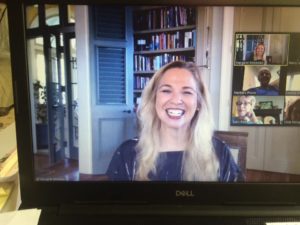
Margaret McMullan talks to Starkville’s book club on Zoom during the Covid pandemic in October, 2020. Photo by Nancy Jacobs
McMullan has been the recipient of various honors and awards. In 2005 she won the Mississippi Institute of Arts and Letters Award for Fiction and the Southwestern Indiana’s Arts Council Award for Artist of the Year. She received a Special Mention in the 2005 Pushcart Prize collection, and twice she received the Individual Artist Fellowship from the Indiana Arts Commission and the National Endowment for the Arts.
She was the 2007 Eudora Welty Visiting Writer at Millsaps College in Jackson, Mississippi. McMullan’s young adult book, How I Found the Strong, won the 2006 Award for Fiction from the Mississippi Library Association, the 2004 Indiana Best Young Adult Book of Fiction, and was named an ALA 2005 Notable Social Studies Book. It was voted a “Great Book” by the state of Maryland Book Consortium and chosen as Evansville, Indiana’s, First Youth Selection for the 2004 One Book/One Community reading program. The work was also selected as one of two books to represent Indiana on the American Library Association’s “Many Voices, One Nation” booklist. It was also named a Booklist‘s Top Ten First Novel for Youth.
McMullan traveled to Israel in 2008 with a writers group and visited Yad Vashem, the Holocaust Museum in Israel. There she discovered the existence of Richard Engel de Janosis, a Jewish relative of hers that had perished at Mauthausen Camp. No one had written any information about him. It became her mission to research Richard and fill out the Page of Testimony for him to send to Yad Vashem.
McMullan applied for and was the recipient of a 2010 Fulbright to teach at the University of Pécs in Hungary. While living in Hungary, she researched her lost relative Richard and wrote the memoir, Where the Angels Lived: One Family’s Story of Exile, Loss, and Return, for which she won the The Mississippi Institute of Arts and Letters award for non-fiction in 2020.
She was also the National Author Winner of the 2011 Eugene and Marilyn Glich Indiana Authors Award in 2011, and her Sources of Light was a 2012 Special Award Winner from the Mississippi Library Association.
Two Reviews of Where the Angels Lived: One Family’s Story of Exile, Loss and Return
Review 1 by Scott Naugle (Adjunct Faculty at Tulane University, Executive Vice President and Chief Operating Officer at BancorpSouth Insurance, and Co-Owner at Pass Christian Books) This review originally appeared in the May , 2019, edition of the The Shoofly Magazine and is reprinted here by permission.
Dearest Margaret,
It was almost fifteen years ago that I first reviewed and wrote about one of your books, How I Found the Strong, for a literary magazine. Your family’s history, on your father’s side, was the impetus for the young adult novel.
While we were friends at the time, we’ve become closer. I consider your family an extended family – your mother Madeleine, husband Pat, and your son James, whom I still can’t believe the years have passed so quickly that he is graduating from college next weekend. You’ve hung up on me during phone conversations and slapped a cellphone out of my hand when I was texting and driving (you were right to do this, even underscoring it with adult language).
For these reasons, I struggled with whether I would have the professional distance to review and discuss Where the Angels Lived. How could I pass judgement on the intensely personal and compelling work of a close friend? Transparency is always the correct approach, so if I am asked to review your most recent work, I’ll be transparent about our long friendship. I wanted you to know this.
Your love for your family, past and present, and their histories appear to be a consistent motivation for your intellectual work. How I Found the Strong was inspired by a long-lost manuscript, The Life and Times of Frank Russell. Frank Russell was the great-uncle of your grandmother on the McMullan side and dictated his remembrances of life in Smith County, Mississippi.
As you recollected in the novel’s afterword, “the part of Frank’s story that interested me the most, however, was what he did not talk about.”
A historical detective, you used the facts at hand and created the story of the young fictionalized Frank Russell into an award-winning novel.
A few years later, in 2008, you visited the Holocaust Museum and learned of a relative you had never heard of – “Richárd.” The museum archivist looked at you and declared, “Look at me, you are the first to ask about him. Do you understand? No one has ever asked about this man, your relative, Richárd. No one ever printed out his name. You are responsible now. You must remember him in order to honor him.”
As the curious and impassioned intellectual I know you to be, you had no choice but to learn more about Richárd Engel de Jánosi.
Like the nonfiction manuscript of Frank Russell that you spun into a beautiful novel, you were presented again with a previously unknown, and hidden, piece of your family’s history. The story of Richárd Engel de Jánosi is so incredible, though, that a nonfiction exhumation of your family’s story through research is the appropriate platform. Life is stranger, and far more brutal, than fiction.
But against what may be the safe or prudent thing to do, in a Hungary that remains deeply anti-Semitic, you traveled to ask questions about a Jewish uncle that you never knew existed nor was ever acknowledged in any way. You met resistance, both official and subtle. As I turned the pages of the advance copy of “Where the Angels Lived” that you were kind enough to give me a few months ago, I feared for your safety.
As you recollect in “Where the Angels Lived,” “Never heard of him,” your mother snaps when you ask about Richard. “You must have it wrong. I don’t have time for this.” Madeleine McMullan hangs up.
Richárd was the son of your great-grandfather, Adolf, as your research in Hungary revealed. Adolf created a vast business empire of land-holdings, lumber, and coal by his mid-thirties. He started without a penny and succeeded despite the anti-Jewish legislation in Hungary. He had to pay “tolerance taxes.” You speculate, “Maybe he was granted immunity as a Jew because he took such good care of his mostly Catholic workers. He built them homes, schools, bathhouses, and churches. He paid for their teachers and priests.”
All of this began to fall apart in the years leading up to 1944. And while many members of the Engel de Jánosi family sent their money to Swiss bank accounts, converted to Catholicism, changed their names, or took the opportunity to leave the country early, Richárd, strong and quietly defiant, resisted.
One of the most beautiful passages in your book is when you use your considerable talents as a novelist to bring Richárd to life for us from the few facts about him: “He looks to be the kind of relative I would have loved – tall, distant, cool. The quiet type, pensive and precise. I would have tried to make him laugh… He looks so sure of himself, even a little defiant, stubborn. Maybe too proud. Maybe he believed too much in his own decency, maybe that’s what got him killed.
What you later learn is that your mother, at the age of ten in April 1939, was spirited from WHofzeile, the family estate, at night with her mother, your grandmother, Carlette. “My mother wore a dark blue coat several sizes too big so that she could grow in to it. My mother had the red measles, which had spread into her eyes. [My grandmother] told my mother not to look back, to never look back.”
Later, as the train was stopped at the border crossing, “the German fear of germs” prevented the officers who boarded the train from entering the cabin where your mother suffered. “Carlette slid the papers under the door… They kept their gloves on… held the documents at the corners” and quickly stamped them.
Learning all of this was too much for you. Against your grandmother’s advice to your mother eighty years ago, you had looked back. “Sitting there in the pew carved of Moravian oak, I start to shake. I curse every last Hungarian who deported or murdered my family. See, Look at me. My mother got out and she had me and I had a son. You didn’t end us.”
Richárd, as you learned, stayed and administered the family businesses until he was met at his front door “by a black car with swastikas on the doors.” He was loaded onto a cattle car and taken to the concentration camp in Mauthausen.
Your mother never discussed the Hungarian side of the family, instead selectively acknowledging the French lineage of her mother’s side. You found and communicated with the only other living member of the Engel de Jánosi family of your mother’s generation, Anna Stein. Recovering from your father’s death and healing from a new hip, your mother was willing to return to Europe in 2013.
As your mother and Anna meet, you reflect that “Keeping secrets kept them alive, but that’s also how they lost contact with their families… They both know how to suffer and they both know how to worry… It’s the living they sometimes have trouble with.”
After the visit with Anna Stein, you boarded a bus with your mother and she begins to cry, “Her weeping becomes guttural, the same sound she made the day my father died. Her slight shoulders shake and she puts her head into the crook of my arm. She is crying for everything and everyone – her dead husband, her father, her mother, her lost family and country. She is crying for herself and for all those in her family she knew and never knew.”
And this Margaret, my dear friend, is what I have to tell you in this long letter – I won’t be able to review Where the Angels Lived if asked. It’s too close. It’s emotional – and yet, in the end filled with hope and love and leaves me with a sense of a future for humanity because of what you did. I cannot add words or commentary to something so beautifully lived and written.
With much love,
-Scott
Review 2 of Where the Angels Lived
by Don Dickinson, former English teacher at Chambersburg High School
I have no intention of trying to write critically of Where the Angels Lived. Margaret McMullan’s writing is remarkable. She writes with clarity, sensitivity, and compassion. Her description is so vivid that I feel I personally have accompanied her to Hungary. I sensed the excitement of her research and the driving force in her journey of honoring her family.
But something about this book is really haunting me. Perhaps it’s McMullan’s ability to create an experience that leaves the reader chilled and in disbelief that any of it really could have happened– knowing that all of it, and more, actually did. Or maybe it’s the awareness that the potential is still very strong today that it all could be repeated. What begins as a day trip in Jerusalem to Yad Vashem, the Holocaust Museum, sends McMullan on a journey and ultimately brings some closure and peace to the author and her family. To the rest of us, it brings a stern and unsettling warning about the way hatred continues to work in the world. McMullan researches her way to discovering her Mother’s ancestors, the Engels (German for angel), almost all of whom died at the hands of the Nazis. One distant cousin, Richard Engel, reaches out to her from the archives and implores her to remember him. And she does.
The Engel de Jánosi were considered nobility in Hungary. They met and mingled with famous names from the past: Richard Wagner, Heinrich Ibsen, Gustaf Mahler, and Sigmond Freud. They were resourceful people who were willing to work hard to prosper, to gain, to flourish. They were willing to make extremely hard sacrifices. But they seemed unable to believe that the unthinkable could, and would, happen. Their world changed forever when a political figure was able to come to power, standing firmly on a platform of hate.
When McMullan is able to spend five months in Hungary, teaching and researching her family, she discovers that Hungarians are still suspicious and wary of outsiders. Antisemitism is not dead; denial is strong. World leaders still plot and plan, blaming others when and where they can. Persecution and genocide are unfortunately still at work.
Where the Angels Lived is a book about remembering. It’s about remembering ancestors and their struggles and sacrifices. It’s about remembering what is decent and important in life, and holding it sacred. It’s about remembering those who will follow us, and shining a light on the path ahead for them. Thank you, Margaret. I will remember.
Interview with Margaret McMullan (October, 2008) SHS student (anonymous)
Where and when were you born? Do you have any siblings?
I was born in 1960 in Newton, Mississippi. I have one sister, Carlette.
What are your parents’ names? What can you tell us about them?
My father James McMullan was born in Lake, Mississippi, and later went into business with his father in Newton. My mother, Madeleine was born in Vienna, Austria. She met my father in Washington, D.C. at a dinner party.
Is your husband also a writer or what does he do?
My husband Pat O’Connor is a screenwriter and a fiction writer. He sold a screenplay to Steven Spielberg and has worked on several films and other screenplays. Right now he owns his own advertising and marketing business called o’connor/creative.
What author do you think has influenced you the most?
The authors who influence me the most are the ones I keep going back to, namely Shakespeare and Faulkner.
Why did you decide to write a young adult novel with the Civil War as its setting? Where do you get your ideas for your books?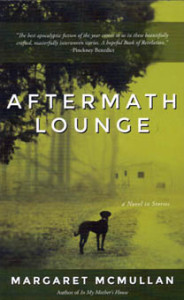
The decision to write How I Found the Strong was not entirely my own. One year, the week before Thanksgiving, my grandmother called us all down to Newton so that she could say goodbye because she knew she was dying. She reminded me of a shoebox in her closet. In the shoebox was a 60-page manuscript. Her great-great uncle, Frank Russell, had talked out his life to a secretary who typed it all down. He had lived before, during, and after the Civil War, but he never talked about the war at all in those 60 pages. After my grandmother’s funeral, I couldn’t stop thinking about Frank Russell – his voice, his life, and all the white spaces in that manuscript, the parts of his life that he left out. That’s what I decided I had to write. It felt as though my grandmother had given me an assignment, and I felt closer to her as a result.
When did you become interested in writing? Was there something in particular that got you interested?
When we moved from Mississippi to the Chicago area, I was in the fourth grade. Back then, people didn’t move around as much as they do now. My classmates heard my accent and made fun of me. A lot. So I grew very quiet. That’s when I started taking notes. I made a little notebook out of notebook paper and colored yarn and recorded the weather, my overly dramatic feelings, what people said, everything. Writing became a habit. Once my sister stole this notebook and read funny sections of it out loud to me and then to my parents. I was mad at first, but then I saw that they were entertained. After that, I started reading to them from my notebook. Years later, in high school, I won a prize from Scholastic Magazine for a story called “Bees.” I got $50 and a gold pen with my name on it. I was officially hooked.
What kind of student were you in high school?
I was a spacey student. I was terrible at math, and I wish I had read more. I loved science, but I wasn’t particularly good at taking tests. I had no intention of staying in the Midwest…which of course landed me in the Midwest for college.
How long did it take you to write How I Found the Strong? Are the characters based on real people?
It took me about one year to write How I Found the Strong,– the quickest I’ve ever written anything. I spent five years researching and writing In My Mother’s House. “Shanks” is based on my idea of what my grandmother’s great-great uncle Frank Russell would have been like as a boy. The other characters are made up characters, compilations of people I’ve known. Buck is quiet and a lot like I was when we moved away from Mississippi.
Are you working on a new book right now? What is it about? (2008)
I’m working on two new books. One is a collection of stories about a family after Hurricane Katrina destroys their town and home. The other book, a book for young adults, is about a 14 year old girl and her mother living in Jackson in 1962, the year before “Freedom Summer.”
Have you received awards for your writing not mentioned above?
When I Crossed No-Bob was named a 2008 Parents’ Choice Silver Honor, a 2007 School Library Journal Best Book, a 2008 finalist for the Willie Morris Prize for Southern Fiction, a Kliatt Editors’ choice: best of the year’s hardcover YA fiction, Winner 2008 Mississippi Institute of Arts & Letters Award for Fiction, Winner Indiana Best Young Adult Book of Fiction 2008, a New England Children’s Bookselling Advisory Council Top 10 Title, a Mississippi Press Book Pick for 2007, a 2008 Honor book, Horace Mann Upstanders Book Award, Antioch University (L.A.); and nominated for 2009 Best Books for Young Adults by the American Library Association.
Do you have any advice for future writers?
Get out, be curious about everybody and everything, travel and take notes, and read, read, read.
Related Websites
- Getting a Memoir Published in a Difficult Market: Q and A with Margaret McMullan is a very interesting interview about McMullan’s recent visit to Israel before she wrote her newest book. Interview by Jane Friedman, May, 2019.
- Margaret McMullan wins the 2020 Non-fiction award from Mississippi Arts and Letters.
- Scott Naugle’s Letter to Margaret McMullan about her newest book in The Shoofly Magazine, May, 2019.
- USA Today article about McMullan new memoir, 2019
- Publisher’s page for Margaret McMullan.
- Reading guides for all her young adult novels.
- Link to movie info about Sacred Hearts written by McMullan and directed by her husband.
- Read the short story Snake Oil by McMullan in the fall 2007 issue of Ploughshares, The Literary Magazine of Emerson College.
- Amazon.com posts reviews of In My Mother’s House and the Prologue to the book.
- Brief excerpt from When I Crossed No Bob and readers’ reviews on Amazon.
- Editorial reviews for How I Found the Strong
- Reviews for When Warhol Was Alive
- Information about McMullan’s book called Cashay
- Link to information about McMullan’s husband Patrick, film writer and director.
Bibliography
- McBain, Roger. “Strong” Family Ties Give Life to McMullan’s Civil War Book.University of Evansville: Faculty News. April 29, 2004. (Reprinted from Evansville Courier & Press)

